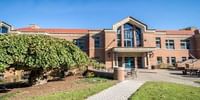- Offered through the University of New Mexico School of Medicine, our program is one of a very few programs administered through an academic Department of Emergency Medicine. This provides our students exceptional opportunities to be mentored by Emergency Medicine faculty and residents, and to participate in the day-to-day activities of a busy academic medical center.
- Our curriculum was designed to teach and train paramedic leaders to be better prepared to handle the realities of a new era in prehospital medicine. By the time they leave EMSA, our graduates are excellent clinicians, teachers, researchers and leaders. They have the breadth of knowledge to think independently, and to push the development of EMS. The program prepares students for advanced study; many of our graduates go on to obtain advanced degrees in education and science, medicine, physician assistant studies and business.
- Following the tradition of the UNM School of Medicine, our curriculum places emphasis on both the science and the humanity of prehospital medicine, throughout all four years of study. Our curriculum begins with general education, including courses in the humanities, the social sciences, and the basic sciences. These courses, including work in history, philosophy, language, and anthropology provide a critical general education. Students are then required to undertake advanced coursework in the sciences, which provides a critical framework for subsequent studies in clinical paramedicine. During the first two years of the program, students become EMT-Basics, and learn the fundamentals of prehospital medicine.
- The focal point of the BS in EMS program is the core paramedic training courses, which are usually undertaken in the third year of the program. Course content is based on the current Paramedic National Standard Curriculum, and the program is fully accredited by the Committee on Accreditation of EMS Programs. These courses are taught by nationally recognized faculty, all who have extensive backgrounds in the delivery of prehospital care. The courses include classroom and laboratory work, as well as clinical experiences in area hospitals and EMS agencies.
- During the final year of the program, students undertake advanced coursework in clinical EMS, and in research and education. Students may take advanced coursework offered by the UNM Anderson School of Management, the College of Education, and the College of Arts and Sciences.
- Emergency medical technicians (EMTs) and paramedics administer first-aid treatment and life-support care to sick or injured persons in pre-hospital setting. Depending on training level, EMTs administer drugs, orally or by injection, and perform intravenous procedures under a physician's direction. In addition to operating equipment such as electrocardiograms (EKGs), external defibrillators and bag-valve mask resuscitators in advanced life-support environments. EMTs assess the nature and extent of illness or injury to establish and prioritize medical procedures.
- EMTs coordinate with other emergency medical team members and police and fire department personnel and are responsible for communicating with dispatchers and treatment center personnel to provide information about situation, to arrange reception of victims, and to receive instructions for further treatment. Working in pairs, EMTs perform emergency diagnostic and treatment procedures, such as stomach suction, airway management or heart monitoring, during ambulance transport. Because emergency services function 24 hours a day, EMTs and paramedics have irregular working hours.
Career Opportunities:



.jpeg?tr=h-100,w-200,c-force)








